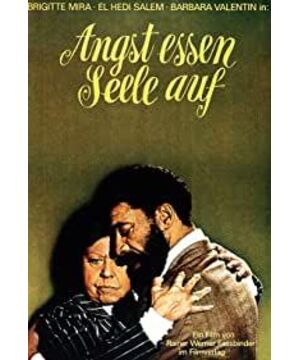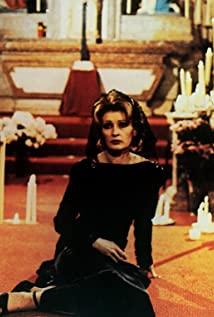The film tells that in German society, a middle-aged Arab encounters an elderly German woman. The kindness of the woman touches him, so they get married. Their relationship made neighbors, relatives, and colleagues very ostracized. At the same time, the two people were incompatible in life due to ethnic differences. The uneasy emotions caused the man to cheat. In the end, the man realized that he was wrong and reunited with the woman.
The film uses color well. The tavern is colorful, creating an impetuous and lively atmosphere; the woman's yellow skirt symbolizes goodwill and beauty; the man's dark suit symbolizes his gloomy character; the warm-colored home creates a harmonious atmosphere between the two.
However, the film is very inadequate in character creation, plot arrangement and theme expression, which highlights Fassbender's subjective superficiality.
The characters in the film are very flat, mainly due to the unreasonable arrangement of the plot. When depicting a man, he does not show his working environment and life, and he seems to come to the narrative space without desire or desire. When the woman proposed to marry, he quickly agreed; after cleaning the basement and no oatmeal he liked, he instantly felt the estrangement from the woman and cheated; after cheating, he slapped himself in the toilet and felt redeemed Reunite with women. The abrupt plot and the rigid performance of the male protagonist look very immature. When it comes to shaping women, women are always in a dilemma - strongly opposed by those around them. Like shaping a man, there is no plot to show her daily life, and each plot is extremely purposeful, all to bring out the theme of "racism". At the same time, the woman has no character change from beginning to end. She accepts everything like a virgin. The only arc is "she actually cares about other people's opinions", but this arc is slightly simple and not innovative enough. Therefore, the film is very immature in the play, not convincing enough, and affects the expression of the theme.
In terms of thematic expression, although it can be seen that the director wants to express his resistance to racial discrimination around the topic of "racial discrimination", the plot arrangement in the film makes the director's expression ambiguous. The man shown in the first half of the film is ideal and kind. The reason why he ignores the huge age difference to be with a woman is not a plot, but is moved by the kindness of the woman, so it can be seen that his heart is to be kind of. But when he faced a trivial matter of "different eating habits", he resolutely derailed. This abrupt plot instantly lowered his identity and made the audience feel disgusted with him. Although the director may want to express his struggles through this episode, in the later episode when the woman goes to the depot to find a man, the man's colleague says "is this your grandma?", the man and the other colleagues burst into sharp laughter at the same time. Through this plot, it can be determined that the director did not firm up his accurate cognition of this character when expressing it. Under the theme of calling for racial equality, using "violation of morality" to portray the flaws of a positive character will only make the audience feel that the tragedy of this positive character is just self-inflicted and not worthy of sympathy.
In general, although Fassbender is sincere and has the original intention of exposing the ugly phenomenon of society, his mediocre works make his expression seem superficial and naive. Compared with his debut film "Love is Colder than Death", the debut film also made a braver attempt in film language, which has certain aesthetic significance. However, this film is based on the "Hollywood" film mode, and does not see any new ideas in the film language, which is dwarfed by the debut.
View more about Ali: Fear Eats the Soul reviews











